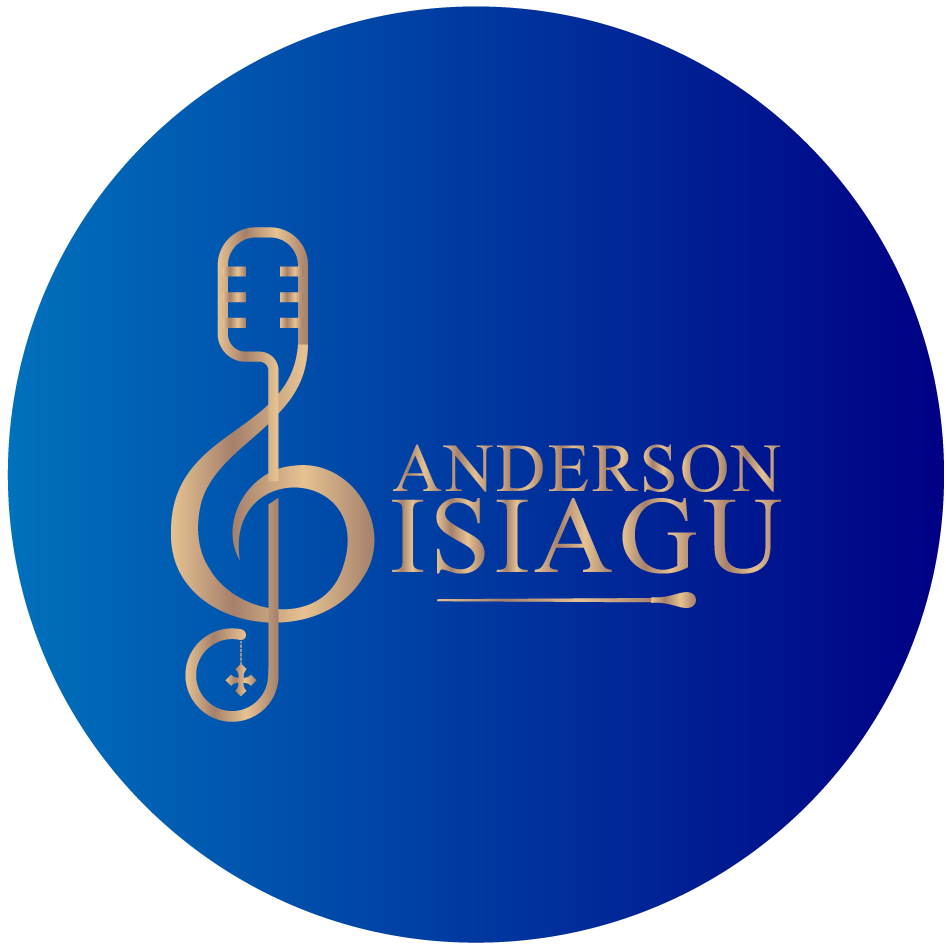Full Bio of Dr. Anderson Isiagu
Anderson Isiagu is a musicologist, educator, composer, conductor, singer, choir/instrumental ensemble director, and business man with more than 20 years of experience. Anderson holds a wealth of educational expertise including a Ph.D. in Musicology from Claremont Graduate University, Master of Music in Composition from Azusa Pacific University, and a Bachelor of Arts in Music Composition from Obafemi Awolowo University. Anderson also holds an Association of Christian Schools International Educator Certificate.
Anderson has won awards including Best Conductor and Best Actor Awards in the church music and art circle. He has successfully led ensembles of all ages. His many compositions include choral works like “Tantum Ergo” (unaccompanied), “The Rest is Silence,” “Meere M Amara,” and “Angele Dei,”; instrumental pieces such as “The Highlife,” “Dreams of Bliss” (for Piano); and string quartets like “Song of the Weary Optimist,” “Happy Sadness,” and “Odogwu N’agha”. He is currently a member of the Association of Music Arrangers and Composers, Society of Composers Inc., The Recording Academy, Society of Music Theory, and American Musicological Society. His gentle, friendly, and collaborative personality allows him to grow relationships as he develops ensembles. Anderson composes and performs a wide range of genres while bringing African and multicultural worldviews center stage.
Anderson was born at St. Gerrard’s Catholic Hospital in Kakuri, Kaduna State, in Nigeria. He was raised by his loving parents alongside five siblings. If you ask him, Anderson will tell you that he cannot recall the particular time or reason he fell in love with music. There were no extended family members with musical talents who Anderson could have been modeling, aside from his sister, Esther, who was involved in the choir and would leave home early to prepare for the 6am church services every Sunday morning. According to Anderson, this was his first connection with art and church music.
Around the age of 6-7, to his parent’s surprise, Anderson made it clear that he wanted to study music and theater arts. His father vowed to help him any way he could. Anderson was bombarded with questions about how he would navigate being a “starving artist”, but he still persevered. This is most impressive because Anderson was a shy and timid child. He struggled to express himself outside of music, and in song, he could deliver his feelings. Whenever he felt sadness or loss, Anderson could express it musically. For instance, when his maternal grandmother died, Anderson grieved terribly because he was close to her. He used melodies to comfort himself through the grief. Looking back, Anderson reflects that the melodies he sang to himself were actually set in the minor scale mode. When he did not know what to say, Anderson could always retreat to the safety of music.
As a young child in school, Anderson experienced learning difficulties that made it challenging for him to excel. He struggled with comprehension and recalling what he had learned that day. When it was time to begin the transition to high school education, Anderson performed badly on the common entrance exam. He even forgot to write his name on the answer sheet, and when the exam scores were released, he had no score at all. This led to his admission into a private school.
The challenges and expectations of private school led him to perk up a bit academically, and, with the help of his mom and sisters, Anderson began to learn for perhaps the first time in his life. He performed below his classmates’ benchmarks, but he held on and continued to progress. In 1993, Anderson was chosen to be part of the nativity play at Christmas. He auditioned and was cast to play Angel Gabriel and double cast as the magi who presented baby Jesus with gold in the manger. The role of the magi was a singing role, and it was his first public performance doing two things he loved: singing and acting.
Not only did Anderson have the time of his life, but the audience was mesmerized. Afterwards, audience members described his performances as “spell-binding” and “awe-inspiring”, with many people telling him they had goosebumps as he performed. This experience transformed Anderson from a shy kid who was struggling in school, into a star. Now Anderson knew what he wanted to do with his life.
For the remainder of his schooling, Anderson was involved in every theater, dance, or musical performance he could be part of. He also improved academically, and he even pushed himself to re-read all the textbooks he could not understand before. Later, his family would move, and he would change schools.
Aside from his learning difficulties, Anderson also spent a majority of his childhood ill with ailments such as malaria and typhoid. Although other family members got sick, Anderson was impacted the most. During one bout of malaria and typhoid, Anderson was pronounced dead while at the hospital seeking treatment. The staff said that he remained dead for over 45 minutes after their attempts to resuscitate him had failed. Miraculously, Anderson woke up. This incident would be a catalyst for his spirituality. He wondered why he was alive and what God wanted from him. He renewed his baptismal vows and decided to give his life to God completely and to pursue a more intimate relationship with Jesus. Anderson has remained a faithful and loyal Christian since then.
While in school, Anderson and his friends formed an a capella group called “The Elects”, and they were popular for serenading the entire school during lunch breaks and events. The name of the group was given by their spiritual patron, his late sister, Rosy. “The Elects” also went to churches on Sundays to bless congregations with music. Anderson was one of the group’s original composers, singers, and lead vocalists.
Moving into upper high school, Anderson served as laboratory prefect and Jets Club President (a science club in Nigeria), but his favorite role was as music director of the Fellowship of Christian Students Choir. The choir’s first performance of the semester was a song written by Anderson entitled “Who Will Lift up the Banner of the Lord?”
To the surprise of many, Anderson studied sciences in senior high school. By the time graduation rolled around, he was allowed three choices for university studies. His top three were chemical engineering, mechanical engineering, and computer science. Each year of applying, Anderson was rejected – until 2006. Interestingly enough, a year before this happened, Anderson released his first album, ‘Cry No More’. It was a gospel album with an eclectic mix of Nigerian Afro-beats, Afro-soul, hip hop, and rap.
Moving forward to 2006, Anderson took the joint matriculation exam and another exam at university. Due to an administrative error, the results of one out of the four subjects he sat for were not released. The then head of The Music Department at Obafemi Awolowo University, Dr. Ademola Adegbite, another of his most cherished mentors, took Anderson to find a way to release his score, to no avail. The director then told him about a diploma program that let students accelerate a year of their studies after two years in the program. Anderson auditioned and was accepted, only then going back to Kaduna to try to raise the funds he needed to attend. Very Reverend Father Anthony Ikhenoba and the late Archbishop of Kaduna Archdiocese, Very Reverend Dr. Peter Yariyock Jatau gave him the support needed to complete his time at Obafemi Awolowo university (OAU). Fr. Ikhenoba continues to be an extremely important figure in Anderson’s life. He has been more than a priest or mentor, but also one of Anderson’s most trusted confidants, friends, and patrons.
While at OAU, Anderson studied music theory and composition and wrote an opera for his final project called ‘Not Far Away’. This was a fusion of Western orchestral instruments and African traditional instruments, as well as vocal techniques and idiomatic expressions common in the two musical cultures. He was also President of the Music Students Association of Nigeria (MUSAN). He enriched the role through servant leadership, transparency, and projects that benefited his fellow students. Anderson also broke a university record by being appointed logistics officer, a departmental position that was typically held by a teacher.
Since then, Anderson has become a cornerstone composer, musician, and music educator. He has helped countless individuals follow their musical dreams with his support and endearing friendship, and Anderson’s innate musicality has been a source of delight for audiences around the world.
Over and over in his life, Anderson has proven to be an overcomer. He knows what it means to financially struggle, to work jobs that result in broken bones, and to look into the eyes of students who are angry that he has replaced their beloved former teacher. In any case, Anderson’s approach is the same. He believes all people are good, and he strives to do good. His resilience has taught him to push through the hard times, and Anderson has the gift of helping others do the same. He gives to those in need, including his own students, and he keeps those who have helped him along the way close to his heart. In 2022, Anderson married his “gift and beautiful wife”, Julia Isiagu née Keplinger. Anderson’s groomsmen were his present and former students. His best man was one of his students who stood by him in his first year and until he graduated. Five years later, the same student reprised that role again by standing next to Anderson as he said “I do” to his beloved bride.
As a teacher, Anderson is tenacious and structured, lending an excellence mindset to his students. During the pandemic, perhaps the most challenging time to be a teacher, Anderson was awarded the March 2021 “Teacher of the Month” for his innovation in teaching instrumental and choral music via Zoom. Anderson brings an award-winning, diverse, and unique style to his teaching and musicality based upon his spirit of overcoming and teaching others to do the same.
He lives in Los Angeles, California with his beautiful wife, Julia.


